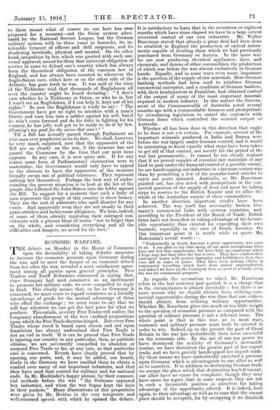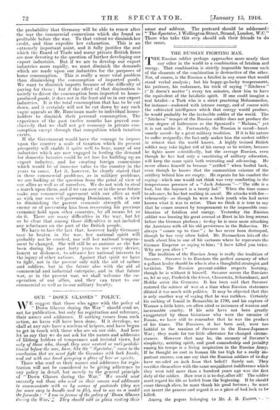ECONOMIC WARFARE. T HE debate on Monday in the House of
Commons upon the desirability of taking definite measures to increase the economic pressure upon Germany during the war, and to meet the danger of an economic attack from her after the war, revealed a most satisfactory agree- ment among all parties upon general principles. Free Traders and Tariff Reformers concurred in saying that, since Germany had used commerce as an instrument to promote her military ends, we were compelled to reply in kind. This clearly means that, so far as Germany is concerned, we must cease to regard commerce as a friendly interchange of goods for the mutual advantage of those who effect the exchange ; we must cease to say that we will buy wherever we can get the best price for what we produce. This entails, as every Free Trader will realize, the temporary abandonment of the two cardinal propositions upon which the Free Trade doctrine hinged. But every Free Trader -whose creed is based upon reason and not upon fanaticism has always understood that Free Trade is not an end in itself. If it can be proved that Free Trade is injuring our country in any particular, then, as patriotic citizens, we are necessarily compelled to abandon or suspend Free Trade so far, at any rate, as that particular case is concerned. Events have clearly proved that by opening our ports, and, it may be added, our hearts, freely to the Germans we have enabled them to obtain a control over many of our important industries, and that they have used that control for military and for national ends. In Mr. Mackinder's happy phrase, by their commer- cial methods before the war " the Germans captured key industries, and when the war began kept the keys in their pockets." Many illustrations of this proposition were given by Mr. Hewins in the very temperate and well-reasoned speech with which he opened the debate. It is satisfactory to learn that in the seventeen or eighteen months which have since elapsed we have to a large extent recovered control of our own industries. Mr. Walter Runciman stated that already a great deal had been done to establish in England the production of optical instru- ments capable of rivalling those which we had previously purchased from Germany or Austria. In the same way we are now producing electrical appliances, dyes, and chemicals, and dozens of other commodities, the production of which was before the war almost exclusively in German hands. Equally, and in some ways even more, important is the question of the supply of raw materials. Here German banking methods had been used to reinforce German commercial enterprise, and a syndicate of German bankers, with their headquarters in Frankfort, had obtained control of the output of many of the most important minerals required in modern industry. In this matter the Govern- ment of the Commonwealth of Australia acted several months ago with a commendable firmness and promptitude by introducing legislation to cancel the contracts with German firms which controlled the mineral output of Australia.
Whether all has been done in this direction that ought to be done is not yet certain. For example, several of the important minerals produced in India and Burma were before the war largely under German control, and it would be interesting to know exactly what steps have been taken to get rid of that control, not merely for the period of the war but permanently. It cannot be too clearly realized that if we permit supples of essential raw materials of any kind to pass under the financial control of a possible enemy, we are handicapping our industries in a far more serious way than by permitting a few of his manufactured articles to enter our ports untaxed. Australia, as Mr. Runciman pointed out, has also acted with promptitude in the con- nected question of the supply of wool and meat by taking steps to reserve to the British Empire and its allies the whole of the Australian output of these commodities.
In another direction important results have been achieved. The war itself has necessarily broken Ger- many's commercial links with oversee countries, and, according to the President of the Board of Trade, British firms have not been slow in taking advantage of the favour- able opportunity thus created for expanding their own business, especially in the case of South America. On this important point it is worth while to quote Mr. Runciman's actual words :— "Undoubtedly in South America a great opportunity was open to us. I am glad to say that many of our most enterprising firms have not lost that opportunity, but have built up connexions which I hope may last long after the war is over. They have studied their customers' tastes with greater ingenuity and faithfulness than they ever did in times of peace. They have been making efforts in commercial travelling which have been almost unprecedented, and indeed we have on the Continent been accused of actually using the war for commercial purposes."
As regards the accusation to which Mr. Runciman refers in the last sentence just quoted, it is a charge that in the circumstances is almost inevitable ; but there is no more reason why we should abstain from utilizing com- mercial opportunities during the war than that our soldiers should abstain from utilizing military opportunities. Whether Mr. Runciman gives too much or too little weight to the question of economic pressure as compared with the question of military pressure is not a relevant issue, The whole point is that in this war, as in most wars, economic and military pressure must both be exerted in order to win. Indeed, up to the present the part of Great Britain in the war has undoubtedly been more successful on the economic side. By the use of our sea power we have destroyed the activity of Germany's mercantile marine, we have destroyed the greater part of her export trade, and we have gravely handicapped her import trade. By these means we have undoubtedly exercised a pressure upon Germany which is advantageous to our allies as well as to ourselves. If in addition to destroying German trade we occupy the place which that destruction has left vacant, our allies have no cause for complaint, though they may have cause for regret that in some respects they are not in such a favourable position as ourselves for taking advantage of the opportunity offered. It is indeed, here again, to their advantage as well as to ours that the vacant place should be occupied, for by occupying it we diminish the probability that Germany will be able to renew after the war the commercial connexions which she found so profitable before the war. To that extent we diminish her credit, and thus expedite her exhaustion. This is an extremely important point, and it fully justifies the zeal which the Board of Trade and many private British firms are now devoting to the question of further developing our export industries. But if we are to develop our export industries more rapidly, we must diminish the demands which are made upon our industries for the purposes of home consumption. This is really a more vital problem than diminishing the consumption of imported goods. We want to diminish imports because of the difficulty of paying for them ; but if the effect of that diminution is merely to divert the consumption from imported to home- produced goods, it does not in the least aid us in our export industries. It is the total consumption that has to be cut down, and it certainly will not be cut down by any such vague appeals as Mr. Runciman made to individual house- holders to diminish their personal consumption. The experience of the past twelve months has proved con- clusively that we shall not get economy in private con- sumption except through that compulsion which taxation exerts.
If the Government would have the courage to impose upon the country a scale of taxation which its present prosperity will enable it quite well to bear, many of our industries which are now engaged in feeding the demand for domestic luxuries could be set free for building up an export industry, and for creating foreign connexions which would be of immense value to the country in the years to come. Let it, however, be clearly stated that in these commercial problems, as in military problems, we are looking at the question from the point of view of our allies as well as of ourselves. We do not wish to steal a march upon them, and if we can now or in the near future make any commercial agreement with our allies as well as with our own self-governing Dominions, with a view to diminishing the present economic strength of our enemy or of preventing him from recovering his previous economic hold upon other countries, by all means let us do it. There are many difficulties in the way, but let us be clear that among those difficulties is not included any reluctance on the part of the British people.
We have to face the fact that, however badly Germany may be beaten in the war, her national spirit will probably not be crushed, nor will her national tempera- ment be changed. She will still be as anxious as she has been during the past forty years to use every device, honest or dishonest, to advance her national interests to the injury of other nations. Against that spirit we have to fight, not in the present only with the aid of sailors and soldiers, but in the future also with the aid of commercial and industrial enterprise, and in that future war, as in the present war, we shall welcome the co- operation of our allies, and they can trust to our commercial as well as to our military loyalty.



































 Previous page
Previous page